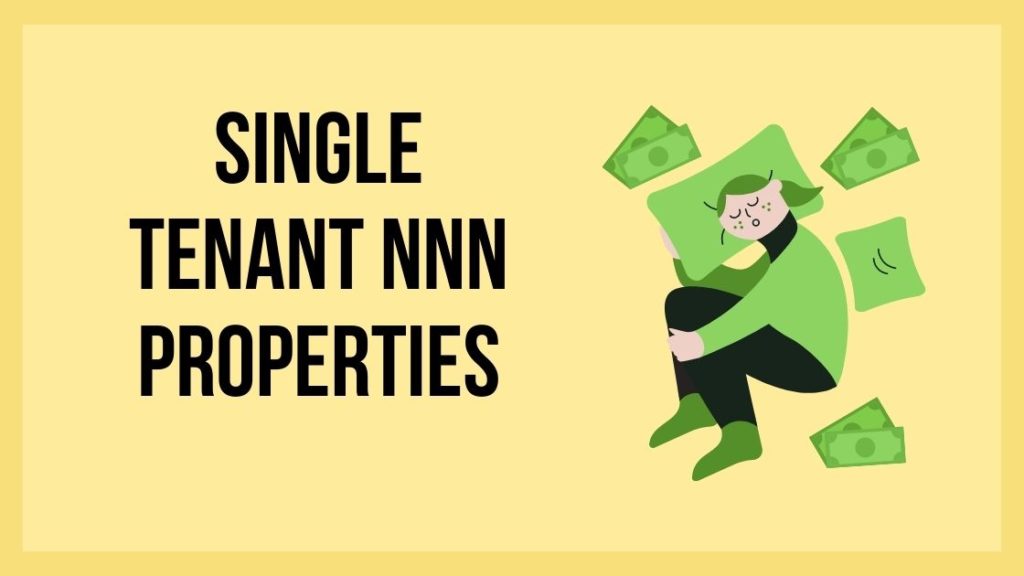
Real estate investors love NNN single tenant properties for several reasons:
- Stability – long term leases provide security for investors
- Security – corporate guarantee ensures rent payments even if the operator vacates
- Less management – lease structure places most maintenance on tenant, not the owner
A popular strategy is to sell management-intensive properties and exchange them for NNN properties. Brokers often market NNN deals as “passive, zero-landlord responsibility” assets with long-term leases. Here are some red flags to watch out for.
Triple net (aka NNN) leases are commercial leases in which the tenant agrees to pay the landlord’s expenses. The tenant pays the landlord’s property taxes, insurance, and common area maintenance.
Agents and commercial brokers cannot provide legal advice to their clients (even though they often do). NNN Commercial leases re multi-year commitments with a major impact on the value of your investment. It is important to know if the lease agreement has any red flags that could impact the value of your investment.
NNN leases for single tenants are long and complicated. Anything that could impact the value of your investment is a red flag. An opt-out clause after 3 years (in a 10 year lease) that will leave your property vacant.
Ready to Protect Your Investment?
Before buying an NNN single tenant property, let Sinai Law Firm review your lease to spot potential red flags. Ensure your investment is secure.
Why it’s Essential to Review a NNN Single Tenant Lease Before you Buy
The lease is the most important determination of future value in a NNN property. A good lease will provide you with not only security, but added value as well.
A review of the lease agreement by an attorney can verify that you are in fact, buying what is being advertised. For example, our firm reviewed sale of a single tenant, NNN property for sale in California. The tenant was a nationwide cell phone provider. The broker advertised it as a “brand-new construction, NNN, corporate guaranteed lease“.
Upon initial review, the name of the guarantor was different than the listed name on the NYSE. Our firm requested clarification from the listing agent. Our own investigation showed the LLC on the lease was a subsidiary of the company. The seller could not produce any evidence to support the credit-worthiness of the tenant. The tenant wanted to shield their liability with a separate LLC in case of a default, which meant the ‘corporate guarantee’ didn’t mean a whole lot. Our client pulled his offer, despite offers from the seller to reduce the price.
Here are the seven most common mistakes investors make when reviewing NNN single tenant leases:
1. Focusing Only on the First Page of the Lease
NNN leases are long for a reason – all the details matter. Rent and expense reimbursement are important, but it’s also important how they are collected, and what is included in ‘common area expenses.’ Some leases allow landlords to transfer management costs to tenants, and some specifically forbid it.
Here are the seven most common mistakes investors make when reviewing NNN single tenant leases:
2. Who is Guaranteeing the Lease?
The corporate guarantee the lease is the most important part of a NNN single tenant lease. Technically speaking, a shell company, or a small LLC is still a corporation that guarantees the lease. But if that entity has no assets and is not credit worthy, who will pay the rent once they close down?
The first thing we do for our clients is to verify the corporate entity. In examining the credit-worthiness, we match the name of the lease with the publicly available information. When evaluating the strength of a corporate guarantee it is important to take into consideration:
- Is the entity rated by the S&P or similar rating companies?
- What is the company’s default rate?
- Are they expanding, closing stores, or staying put?
- Is the tenant’s core business resistant to technological disruption?
A credit tenant will pay the rent even if the store shuts down. It is part of the reason these properties command a premium. Making sure this is the case is the important role of an attorney in a transaction.
3. Beware of Leasebacks!
Leasebacks in NNN single tenant sales are common practice, but have potential issues buyers have to be aware of. In a leaseback situation, the tenant is also the seller in the transaction. Sellers will draft a lease to themselves at a high rental rate, sign it, and then ask an inflated sale price to investors. The high rent might seem enticing, but a low cap rate, you investors are running the risk of being penny smart and dollar stupid.
In a leaseback situation, we always recommend our clients to either draft a custom lease, or re-negotiate the existing lease.
4. Options and Escalations
Rent Increases – the lease should have automatic rent increase schedule. In some leases the property owner must notify the tenant of a rent increase to activate it. Escalations in rent are important for NNN investors as a protection from inflation. Yearly rent increases are a major factor in protecting property values.
Options – any option to purchase the property by the tenant, also known as right of first refusal, is a red flag. These options provide the tenant with very strong leverage in a sale situation.
Investors should also note the how the lease dictates options to extend the term. Does the lease term renew automatically? Does the tenant have an exclusive option to extend?
5. Falling for the “Zero landlord responsibility” Trap
The phrase “zero landlord responsibility” is common in NNN single tenant listings online, but it is also an oxymoron. Investors seeking a passive investment are better off buying government bonds or index funds. Any real estate investment requires monitoring and supervision.
The structure of the lease determines the time investment required for the property. This is why it is very important to understand the obligations under the contract before buying.
Avoid Costly Mistakes!
Ensure your NNN lease is solid. Contact Sinai Law Firm today for a comprehensive lease review and protect your investment.
6. Not Reviewing the Triple Net Provision
The NNN reconciliation can look very different from one lease to another. In some cases, the tenant pays the property taxes directly upon proof of the invoice. In other cases, the property owner pays the bill and then asks the tenant for reimbursement.
Here’s a brief overview of what we look for before buying a NNN single tenant investment:
Property Taxes
- Under what conditions can the tenant dispute a property tax assessment?
- In case of a property tax assessment dispute, which party is in charge of the process with the county? Who pays for it?
- Does the current lease have a property tax reassessment protection in case of a sale? – this is crucial to know. In California, a sale triggers a property value reassessment by the county, and a new tax base to calculate property taxes. Many corporate leases have provisions that prevent large increases of property taxes as a result of a sale.
- Does the lease allow the tenant to reimburse the landlord in payments or one lump sum?
Insurance
- Does the tenant carry insurance for 3rd party liability for inside the structure and common areas?
- What losses are covered under the policy?
- Does the insurance coverage mandated by the lease match the requirements by the lender used by the property owner to buy the property?
CAM – Common Area Maintenance
- Can the property owner charge the tenant a management fee?
- Who pays for capital expenditures that are required for the property, such as asphalt, new roof, or HVAC system?
- Under what condition can the tenant dispute a charge or refuse to pay?
- Can the property owner increase the CAM payments?
7. Assuming the Tenant Will Lease the Space Forever
Here is what we ask every client during escrow:
“What happens when your tenant leaves, breaks the lease, or sells the business?
No tenant stays forever. Investors have to prepare for this contingency before buying the property. It does not matter how many years remain on the lease, or how solid the current financials of the tenant. Over a span of 10-15 years, things can change. Landlords who leased spaces to RadioShack in the 80s suffered losses in the 90s. Blockbuster Video closed down thousands of stores in a matter of a few years. Technology and shifting consumer demand are an inevitability.
A strong lease can’t stop the wheels of time, but it can help mitigate those losses.
Ready to Make an Informed Investment?
Investing in NNN single tenant properties can be a great opportunity, but it’s essential to review the lease agreements thoroughly to avoid costly mistakes. If you’re considering a real estate investment or need a detailed lease review, contact Sinai Law Firm today. Our experienced team, led by Avi Sinai, a trusted real estate attorney, can help you navigate the complexities of NNN leases and ensure your investment is secure.
Contact Sinai Law Firm to schedule a consultation and protect your investment. Don’t leave the future of your real estate ventures to chance—get the legal support you need today!
